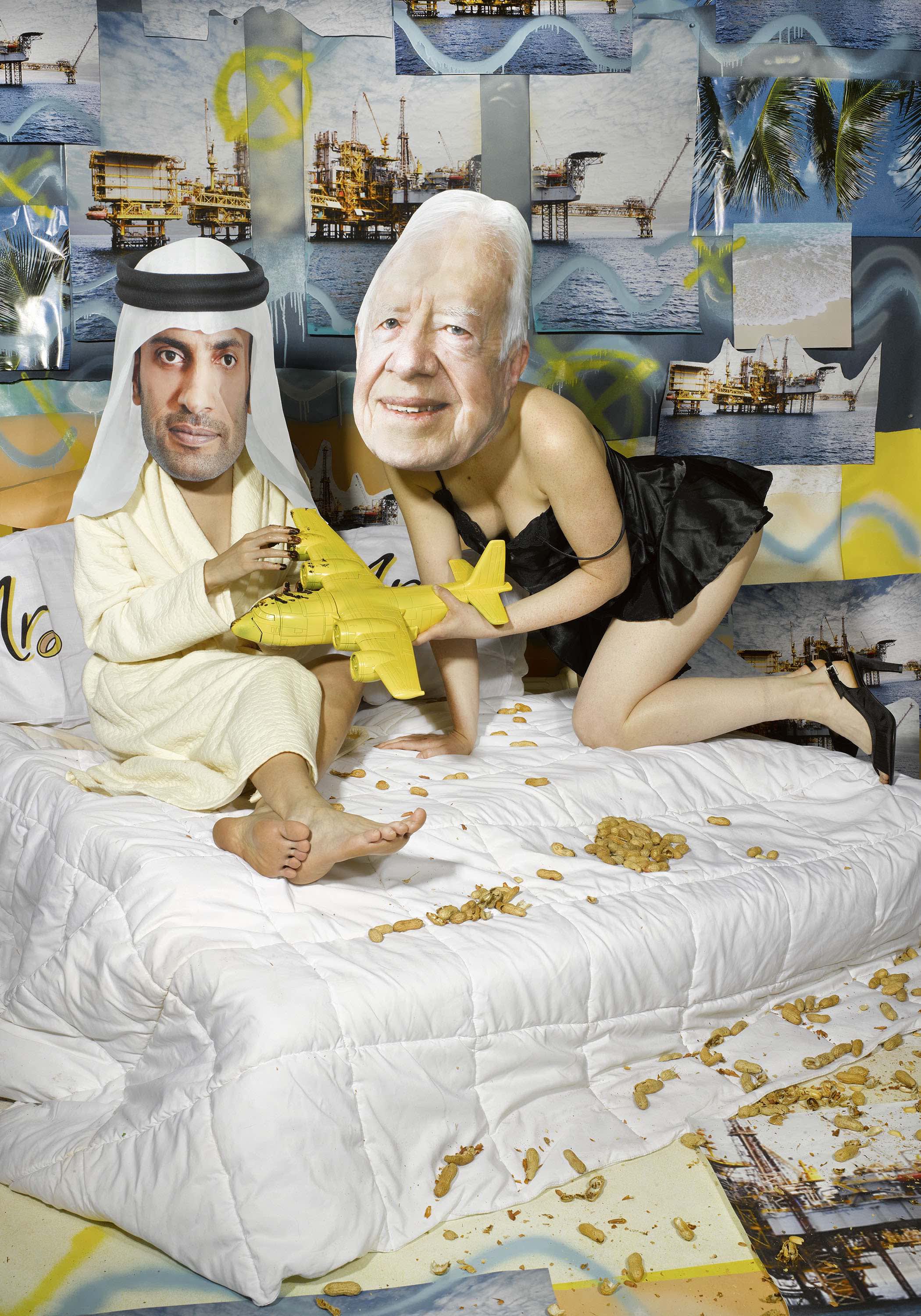14 January 2020 She does not belong to the family and definitely wouldn't mourn the death of Qassem Soleimani, but politics is never far away with Sheida Soleimani. Through her caricatural photo collages, the Iranian-American photographer comments on the geopolitics of the oil race.

Sheida Soleimani, Minister of Petroleum, UAE & Former President of the United States, 2018, archival pigment print, 152.4 x 101.6 cm
The career of Iranian-American photographer Sheida Soleimani (29) seems to be rising as steeply as an Iranian rocket. Just before Christmas, the leading Artnet website named her one of the twelve 'emerging artists' of 2019. The New York Times and Vice Magazine published her absurd, satirical photo collages. And now Europe must go for it. After an exhibition in London, Soleimani - not a family of the murdered top general - had her first solo exhibition on the European mainland.
With five photos and one video, 'Medium of Exchange' in Brussels is a small exhibition, but the works are frisky, naughty, original and very topical, especially now that relations between the West and Iran are even more fraught.
In the exhibition Soleimani questions the relationship between the OPEC countries - to which Iran belongs - and western political powers, on the basis of the West's oil dependence, particularly the United States. That sounds heavy and serious, but there is a lot of humor in her socially critical photography.
Her photos portray rulers who are wrapped around the black gold in a mating dance. The characters reside in a universe of bizarre excess, romance and aggression and are set against a background of oil fields and refineries. Everything has been staged and photographed with real actors in her photo studio in Providence (USA). Soleimani made the masks of the depicted heads of state and political protagonists. They give her photos a great, caricatural expressiveness.
In one photo, a model in a dress and stiletto heels wears a mask of the American former president Jimmy Carter. The model sits on a bed and bends over to an Arab oil sheikh. They are holding a yellow plane whose front is smeared with black oil stains. The two are ready to make love, Soleimani says. "It's their wedding night." The image refers to the Carter doctrine from 1980, which stated that any necessary means were justified to ensure unrestricted access to the Persian Gulf oil, even if the US had to arm oil-producing countries for it. Hence the yellow war plane. "The plane is the dick," Soleimani says.
In another image, a black hand holds a pair of oil-stained diamond rings. It turns out to be a detail of a scene from a geopolitical flirtation between the Angolan minister of Oil and the American former foreign minister Henry Kissinger, the visitor learns about the staged engagement ritual when he sits down in an army tent. A film is being played there that brings the bizarre scenes of her witty photos to life.
Soleimani also comments on the senseless display of wealth in the Gulf States. Her photo of a falcon with a keffiyeh and a collar of Allah makes a mockery of a well-known photo from a couple of years ago of the 80 falcons of a Saudi prince who were accompanied by a personal companion on an airplane.
Criticism
'Medium of Exchange' is her fourth photo series. It is the first time that the Iranian-American questioned the geopolitical relations between the West and the East so clearly. Her first projects were strongly focused on Iran. From America she did what was not possible for her parents in Iran: to criticize Iran.
Soleimani is a child of two political refugees. Her father, a doctor and an activist, fled Iran via Turkey, spent a year in Italy and moved to the US in the mid-80s. Her mother was imprisoned and tortured. The two met in 1987 in the US. Their daughter's first photo series was a flaming criticism of human rights violations in Iran. Through the dark web she had contacted lawyers of women who were stoned or tortured like her mother. They cut up their clandestine sent photos into satirical collages that resemble the photos in the exhibition.
She received death threats and Iran even suspected her of espionage for a while. It means that she has never been to her parents' homeland. She definitely wants to do that someday. The human rights violations still make her angry, she says with an American tongue. "But Iran also has incredibly beautiful sides. It is one of the oldest civilizations and cultures in the world. I still dream in Persian."

